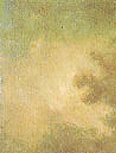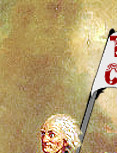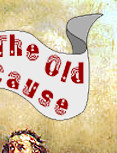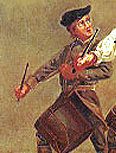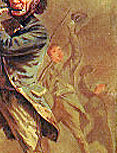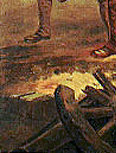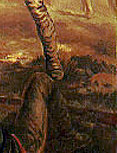'ANTI-FEDERALIST'
AND DECENTRALIST
Taylor
preferred managing his properties and promoting agricultural
improvement, to politics, as his brief forays into
political life suggest. On the other hand, he could
not overlook anti-republican folly and wrote a number
of important works to set out his views on the proper
relation of people and government. Among these was
An
Inquiry into the Principles and Policy of the Government
of the United States (1814), an answer – twenty
years in the writing – to John Adams' Defense
of the Constitutions of the United States.
Taylor
had been an "anti-federalist" (a term of
art) during the debate over ratification of the Constitution.
After the new government came into being, Taylor and
other former anti-federalists argued for interpretations
of the new document in line with their principles.
This was hardly arbitrary and it can be argued that
the "intentions" of the ratifiers outweigh
those of Mr. James Madison. Ten amendments incorporating
the anti-federalists' chief concerns – especially
as to the scope and powers of the new government in
relation to the states – had been quickly adopted,
giving enemies of centralization and mercantilism
an entirely plausible platform (the fantasies of Garry
Wills notwithstanding.).
A
LIBERAL-REPUBLICAN SOCIOLOGY OF POLITICS
Naturally,
the triumphant federalists kept their side of this
constitutional bargain or compromise in much the same
way that England honored the details of the treaty
uniting the kingdoms of England and Scotland in 1707,
which is to say that violations began immediately.
Faced with federalist mercantilism and specific outrages
like the Alien and Sedition Acts, Taylor weighed the
secession of Virginia to secure the reserved rights
of the state and its people. The revolution of 1800
– the election of Jefferson and the eclipse of the
Federalist Party nationally – averted the crisis.
Taylor was soon to learn that his own associates –
in power – were quite capable of taking up where their
opponents had left off.
In
the writings which came out of his confrontation with
national state-building, Taylor drew alike on the
heritage of republican theory and the newer ideas
of laissez faire liberalism. In the end, his synthesis
bore a great resemblance to that of the French "industrialist"
(radical liberal) school from the 1820s onward. Government,
improperly framed, he believed, gave some men the
opportunity to live parasitically by political means.
As
Taylor put it: "No nation was ever oppressed,
ruined or enslaved by the prodigality of individuals;
all nations have suffered some of these evils from
the prodigality of governments." Instead, the
people were ruined by the "regular advances,
which artificial interests or factions are forever
making in straight or zigzag lines, against the citadel
of our rights and liberties." The result, in
America, was a "paper aristocracy" resting
on tariffs and national debt, which threatened to
be more costly and oppressive than even the feudal
system had been. Established churches, after all,
had been content to make a prior claim on a mere ten
percent of the people's production. Taylor estimated
that the paper aristocracy was extracting as much
as forty percent of its victims' earnings.
Getting
to the heart of what we now variously call neo-mercantilism,
corporatism, or interest-group liberalism, he wrote:
"As the members of the government, and members
of legal frauds, both extract power and income from
the majority, they are apt to coalesce; and each party
to favour the designs of its ally, in their operations
upon the common enemy. Hence governments love to
create exclusive rights, and exclusive rights cling
to governments. The ligament of parent and child,
binds them together, and the power of creating these
abuses, must make them props for its support, or instruments
for its subversion." [my emphasis]
This,
in a word, is the political basis of "class
conflict" – politics as plunder – and here
Taylor agrees with the French liberals and anticipates
the similar arguments of John C. Calhoun.
WAR
AND PEACE
As
matters stood, considerable power of patronage and
corruption had accrued to the American presidency.
In time of war these powers were greatly increased:
"War is the keenest carving knife for cutting
nations up into delicious morsels for parties and
their leaders." Given such views, it is not surprising
that Taylor opposed the War of 1812 – the creation
of his own political party.
A
POSITIVE PROGRAM FOR REPUBLICAN LIBERTY
The
solution seemed clear enough: "Remove the legal
base from under the stock jobbers, the banks, the
paper money party, the tariff-supported manufacturers,
and so on; destroy the system of patronage by which
the executive has corrupted the legislature; bring
down the usurped authority of the Supreme Court."
This was a tall order, and one never fully put into
practice even by Andrew Jackson and Martin Van Buren,
who carried out some of the details.
Like
F. A. Hayek in his last works, Taylor thought that
a proper political/legal framework could remove most
of the incentive for the policies he opposed. Thus
he sought to distribute power: "Our policy divides
power, and unites the nation in one interest…."
Power was to be divided between branches of government
and between the federal and state governments, leaving
no one "sphere" able to claim a final
sovereignty over all. Hence Taylor's insistence on
"strict construction" of constitutions and
the notion of delegated, limited powers. And hence
his disagreement with James Madison's proposition
that endless territorial expansion across the continent
would prevent the evils of faction. Expansion, periodic
elections, and all the rest were not as decisive as
the proper division and distribution of power.
CHATTEL
SLAVERY AND POLITICAL SLAVERY
Now,
there may be those who will say that Taylor overlooked
a great abuse – chattel slavery – in which he himself
participated. Perhaps so. Like many of his contemporaries,
he wished to be rid of slavery in some remote future,
if emancipation could be undertaken without destroying
his own society. But I leave this matter to one side,
as there are tens of thousands of scholars working
overtime on such matters, a good many of whom find
therein the justification of a permanent federal campaign
against actually existing American life. Let us leave
them to their fun.
Taylor's
views survive their limitations. Chattel slavery,
after all, was only one institution, one abuse, and
it could be and indeed was abolished, although one
might wonder whether a state-strengthening war with
some 620,000 deaths was the best or only way to accomplish
that end. I do not wish to argue the last point here.
Rather, my point is that all the other abuses
– the ones John Taylor so ably took on – are still
with us, and in aggravated forms which could only
astound both Taylor and his 19th-century
antagonists. It was therefore with good reason that
William Appleman Williams wrote that John Taylor "made
the best case against empire as a way of life."
Taylor
clearly understood the connection between state power
at home and abroad. A republican empire was contradictio
in adjecto.
Sources
Robert E. Shalhope, John
Taylor of Caroline (Columbia, S.C., 1980),
William Appleman Williams, Empire
As A Way of Life (New York, 1980), pp. 49-50,
John Taylor, Arator (Indianapolis, 1977 [1818]),
and An
Inquiry into the Principles and Policy of the Government
of the United States (New York, 1969[1814]),
and Joseph R. Stromberg, "Country Ideology, Republicanism,
and Libertarianism: The Thought of John Taylor of
Caroline," Journal
of Libertarian Studies, VI, 1 (Winter 1982),
pp. 35-48.
